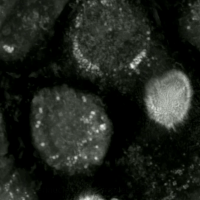Ferroptosis

Ferroptosis is a form of regulated cell death characterized by the accumulation of lipid peroxides. It is distinct from other forms of cell death such as apoptosis, necrosis, and autophagy. Discovered in 2012, ferroptosis is induced by the failure of the cellular machinery to detoxify lipid reactive oxygen species (ROS), leading to lethal lipid peroxidation. This process is iron-dependent, hence the name ferroptosis, from the Latin ferrum meaning iron, and -ptosis indicating a falling or death.
Mechanism[edit]
The mechanism of ferroptosis involves several key components, including iron metabolism, lipid peroxidation, and the glutathione-dependent antioxidant defense system. Iron plays a central role in ferroptosis by participating in the Fenton reaction, which produces hydroxyl radicals from hydrogen peroxide. These radicals can initiate lipid peroxidation, a damaging process to cell membranes. Lipid peroxides are then formed, leading to cell membrane rupture and cell death if not efficiently removed.
The glutathione (GSH) antioxidant system, particularly the enzyme glutathione peroxidase 4 (GPX4), is crucial in preventing ferroptosis. GPX4 uses GSH to reduce lipid hydroperoxides into non-toxic lipid alcohols, thus inhibiting lipid peroxidation. Inhibition or depletion of GPX4 activity can induce ferroptosis.
Biological Significance[edit]
Ferroptosis has been implicated in various diseases, including cancer, neurodegenerative diseases, ischemic organ injury, and kidney disease. In cancer, certain tumors are highly susceptible to ferroptosis, making it a potential target for cancer therapy. In neurodegenerative diseases, such as Parkinson's disease and Huntington's disease, iron accumulation and lipid peroxidation are common features, suggesting that ferroptosis may play a role in their pathogenesis.
Therapeutic Implications[edit]
The induction of ferroptosis has emerged as a novel therapeutic strategy in cancer treatment. Drugs that can specifically induce ferroptosis in cancer cells, sparing normal cells, are being explored. Conversely, inhibiting ferroptosis may be beneficial in conditions where cell death is undesirable, such as in acute kidney injury or neurodegeneration. Compounds that can inhibit iron-dependent lipid peroxidation or enhance the antioxidant defense system are potential therapeutic agents.
Research Tools[edit]
Several compounds have been identified as tools for studying ferroptosis, including erastin and RSL3. Erastin induces ferroptosis by inhibiting the cystine/glutamate antiporter, leading to depletion of GSH and inactivation of GPX4. RSL3 directly inhibits GPX4, triggering ferroptosis. These tools are invaluable for understanding the molecular mechanisms underlying ferroptosis and for identifying potential therapeutic targets.
Conclusion[edit]
Ferroptosis is a unique form of cell death with significant implications for human health and disease. Understanding the mechanisms that regulate ferroptosis and identifying ways to modulate this process could lead to new treatments for a variety of diseases.
Ad. Transform your life with W8MD's Budget GLP-1 injections from $49.99


W8MD offers a medical weight loss program to lose weight in Philadelphia. Our physician-supervised medical weight loss provides:
- Weight loss injections in NYC (generic and brand names):
- Zepbound / Mounjaro, Wegovy / Ozempic, Saxenda
- Most insurances accepted or discounted self-pay rates. We will obtain insurance prior authorizations if needed.
- Generic GLP1 weight loss injections from $49.99 for the starting dose of Semaglutide and $65.00 for Tirzepatide.
- Also offer prescription weight loss medications including Phentermine, Qsymia, Diethylpropion, Contrave etc.
NYC weight loss doctor appointmentsNYC weight loss doctor appointments
Start your NYC weight loss journey today at our NYC medical weight loss and Philadelphia medical weight loss clinics.
- Call 718-946-5500 to lose weight in NYC or for medical weight loss in Philadelphia 215-676-2334.
- Tags:NYC medical weight loss, Philadelphia lose weight Zepbound NYC, Budget GLP1 weight loss injections, Wegovy Philadelphia, Wegovy NYC, Philadelphia medical weight loss, Brookly weight loss and Wegovy NYC
|
WikiMD's Wellness Encyclopedia |
| Let Food Be Thy Medicine Medicine Thy Food - Hippocrates |
Medical Disclaimer: WikiMD is not a substitute for professional medical advice. The information on WikiMD is provided as an information resource only, may be incorrect, outdated or misleading, and is not to be used or relied on for any diagnostic or treatment purposes. Please consult your health care provider before making any healthcare decisions or for guidance about a specific medical condition. WikiMD expressly disclaims responsibility, and shall have no liability, for any damages, loss, injury, or liability whatsoever suffered as a result of your reliance on the information contained in this site. By visiting this site you agree to the foregoing terms and conditions, which may from time to time be changed or supplemented by WikiMD. If you do not agree to the foregoing terms and conditions, you should not enter or use this site. See full disclaimer.
Credits:Most images are courtesy of Wikimedia commons, and templates, categories Wikipedia, licensed under CC BY SA or similar.
Translate this page: - East Asian
中文,
日本,
한국어,
South Asian
हिन्दी,
தமிழ்,
తెలుగు,
Urdu,
ಕನ್ನಡ,
Southeast Asian
Indonesian,
Vietnamese,
Thai,
မြန်မာဘာသာ,
বাংলা
European
español,
Deutsch,
français,
Greek,
português do Brasil,
polski,
română,
русский,
Nederlands,
norsk,
svenska,
suomi,
Italian
Middle Eastern & African
عربى,
Turkish,
Persian,
Hebrew,
Afrikaans,
isiZulu,
Kiswahili,
Other
Bulgarian,
Hungarian,
Czech,
Swedish,
മലയാളം,
मराठी,
ਪੰਜਾਬੀ,
ગુજરાતી,
Portuguese,
Ukrainian
